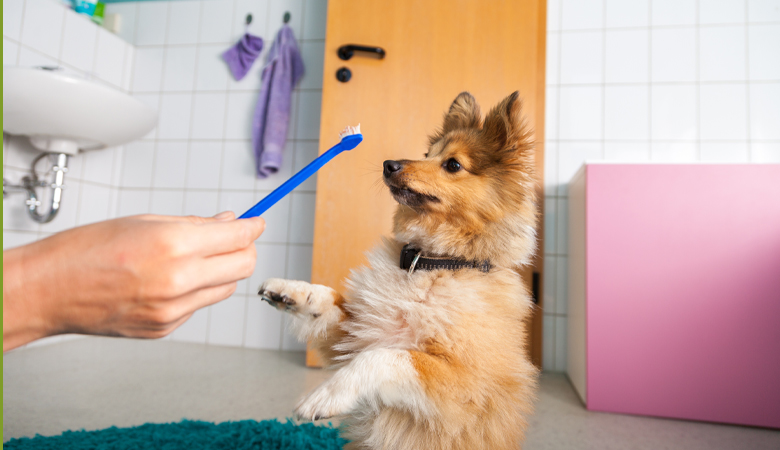Dental care for dogs
Written by Tommy |
Dental problems in dogs are more common than people think. Although about 98% of veterinarians advise dog owners to brush their pet’s teeth, only about 2% of dog owners follow that advice. In addition, research has shown that 80% of dogs older than three years have dental problems, while only 23% of dog owners indicate that their four-legged friend has problems with the teeth.

Prevent dental problems in dogs
Dental problems in dogs are often caused by plaque and tartar in addition to trauma (for example, the breaking of teeth). At the formation of dental plaque, factors such as genetic predisposition, the absence of regular dental care, reduced chewing activity, and diet can all play a role. Dental plaque is a barely visible layer that constantly forms on the teeth. It consists of food debris, mucus and bacteria. If not removed, plaque calcifies into tartar. You can help remove dental plaque yourself. Tartar can only be removed by your vet. Anyone who has ever seen or smelled a dog with dental problems knows how important it is to take good care of a dog’s teeth. If the dog’s teeth are neglected, the animal can even lose teeth. Much worse, your dog’s health is jeopardized by dental problems. Complaints can range from bad breath to tooth loss or even inflammation in important organs, such as the heart, kidneys and liver due to bacterial clots getting stuck in the small blood vessels.
Bad smell from your dog’s mouth is not normal
It is a persistent misconception that it is normal for a dog to have bad breath. If a dog persistently has bad breath, it could be a sign of a dental problem. To prevent this, it is important to take care of your dog’s teeth daily and have them checked regularly by your vet.
How can you recognize dental problems?
You can recognize dental problems in your dog by symptoms such as bad breath, difficulty chewing, red or bleeding gums, and brown deposits on the teeth. Behavioral changes, such as eating less or scratching at their mouth, may also indicate dental issues. If your dog seems to experience pain while eating or chewing, it is advisable to have their teeth checked by your veterinarian.
How can you prevent dental problems?
Dental problems are largely preventable with good daily dental care. Brush your dog’s teeth using a special dog toothpaste and a toothbrush or finger cloth suitable for dogs. Offer appropriate chew snacks that help remove dental plaque, but ensure they are not too high in calories. Chew toys specifically designed for dental health can also contribute to cleaner teeth. Additionally, there are special products available to maintain your dog’s oral health, such as dental care diets, mouthwash, and enzymatic powders. These support oral hygiene and help reduce plaque and tartar buildup.
When is dental care necessary?
Dental care is essentially always necessary, but it becomes particularly important if you notice your dog has difficulty chewing, bad breath, or developing dental plaque. Even if your dog does not show visible symptoms, regular dental care can prevent many issues. Routine dental checkups by a veterinarian are recommended, especially for dogs over the age of three, as this is when most dental problems
Brushing your dog’s teeth
Use toothbrushes and toothpaste to brush your dogs teeth, specially developed for dogs, such as in the C.E.T. Dental Care Kit. The kinds of toothpaste often have a tasty meat taste, so that dogs do not refuse the toothpaste. If possible, start brushing your pet’s teeth early, preferably when a puppy is between 8 and 12 weeks old. If you start later, the dog needs more time to get used to getting its teeth brushed. Some pets never get used to it.
You don’t have to open your dog’s mouth all the way to brush. In most cases, it is sufficient to lift the lip and then clean all visible parts on the outside of the teeth. Also, the teeth uses for chewing and the inside of the teeth should not be forgotten. Some teeth and molars of the upper jaw help clean parts of teeth and molars in the lower jaw.
Dental care products for dogs
In addition to a toothbrush and toothpaste, there are various dental care products available that help care for your dog’s teeth:
- Chew sticks remove some of the plaque and tartar
- Supplements in the form of powders and liquids contain agents that soften plaque, making it easier to remove by brushing or chewing products. They also kill bacteria and provide fresh breath
- Almost all commercial animal food brands have a dental diet, specially developed for the care of the teeth
- Finally, there are also various toys available that contribute to the care of the teeth through their shape
Brushing is the best way to clean the teeth. If your dog won’t allow this, you can consider one of the other methods. It works best to combine and use multiple methods, such as brushing and one of the methods mentioned above. If in doubt, you should always consult your veterinarian to ask them to examine your dog’s teeth and indicate what your dog needs.
Do you have any questions about dental care for your dog? Please contact our veterinary team via veterinarian@vetsend.co.uk.



